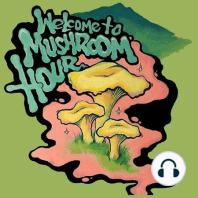67 min listen

Ep. 85: Fungal Plant Pathogens, Dimorphic Transformation & Lessons from Smut Fungi (feat. Dr. Michael Perlin)
Ep. 85: Fungal Plant Pathogens, Dimorphic Transformation & Lessons from Smut Fungi (feat. Dr. Michael Perlin)
ratings:
Length:
95 minutes
Released:
Jun 18, 2021
Format:
Podcast episode
Description
Today on the Mushroom Hour Podcast we are joined by Dr. Michael Perlin, Professor in Biology at the University of Louisville. Dr. Perlin’s interests drew him to study host/pathogen interactions at the University of Chicago and his PhD work centered on the evolution of bacterial resistance to certain classes of antibiotics/antimicrobials. As he was near to completing his degree, a friend of his stopped by the lab and introduced him to a different microbial system: a fungal pathogen that infects flowering species in the Carnation family and replaces the pollen of the flower with fungal spores. From that point he was hooked. Over the years he has continued to work on bacterial resistance, but in the last 10 years, he has shifted the focus of his lab exclusively to that on fungal plant pathogens, with projects encompassing three different types of pathogens on different hosts and the use of the yeast, Saccharomyces cerevisiae, as a model tool in the exploration of some questions more easily investigated in this well-developed system. Dr. Perlin has roughly 70 peer-reviewed scientific articles in reputable journals, including Nature; mBio; BMC Genomics; Genes, Genomes, Genetics (GGG); Fungal Genetics and Biology; Journal of Bacteriology; Eukaryotic Cell; and Molecular Microbiology. As a member of a number of scientific organizations and a prolific teacher and mentor, Dr. Perlin has a far-reaching influence on his field and has directly played a role in the careers of many PhD students. I’m excited to learn more about how fungal phytopathogens that have a massive impact on human culture. TOPICS COVERED: Journey into the Life Sciences Influence of Dr. Stephen Lerner Antibiotic Era & Understanding Microbial Evolution in Preventing Antibiotic ResistanceFungal Phytopathogen Interactions Emerging Disease from Fungal Plant Pathogens as Primary Threat to Modern Human Society Physiology and Life Cycle of Smut Fungi Systems Studied Over Three Decades of Research at University of Louisville Extrapolating Insights from Fungal Pathogens to Other Systems Dimorphic Switch from Benign Yeast Form to Infectious Filamentous Form Signaling Pathways in Cells Triggering Dimorphic Transformation Precautionary Principle in Science Protein “Effectors” Produced by Pathogens that Manipulate Hosts Perlin Lab and Collaborative Science Studying Mitochondria Inheritance in Model Fungal Systems EPISODE RESOURCES: Dr. Perlin Website: https://louisville.edu/biology/faculty/perlin Stephen Lerner (Inspiration): https://photoarchive.lib.uchicago.edu/db.xqy?one=apf1-10357.xml Microbotryum violaceum (fungus): https://en.wikipedia.org/wiki/Microbotryum_violaceum Ustilago maydis (fungus): https://en.wikipedia.org/wiki/Corn_smut Coccidia (pathogen): https://www.sciencedirect.com/topics/medicine-and-dentistry/coccidia Ophiocordyceps unilateralis (fungus): https://en.wikipedia.org/wiki/Ophiocordyceps_unilateralis
Released:
Jun 18, 2021
Format:
Podcast episode
Titles in the series (100)
Ep. 2: FreshCap - Activating Minds & Bodies via Education & Medicinal Mushrooms (feat. Tony Shields) by The Mushroom Hour Podcast